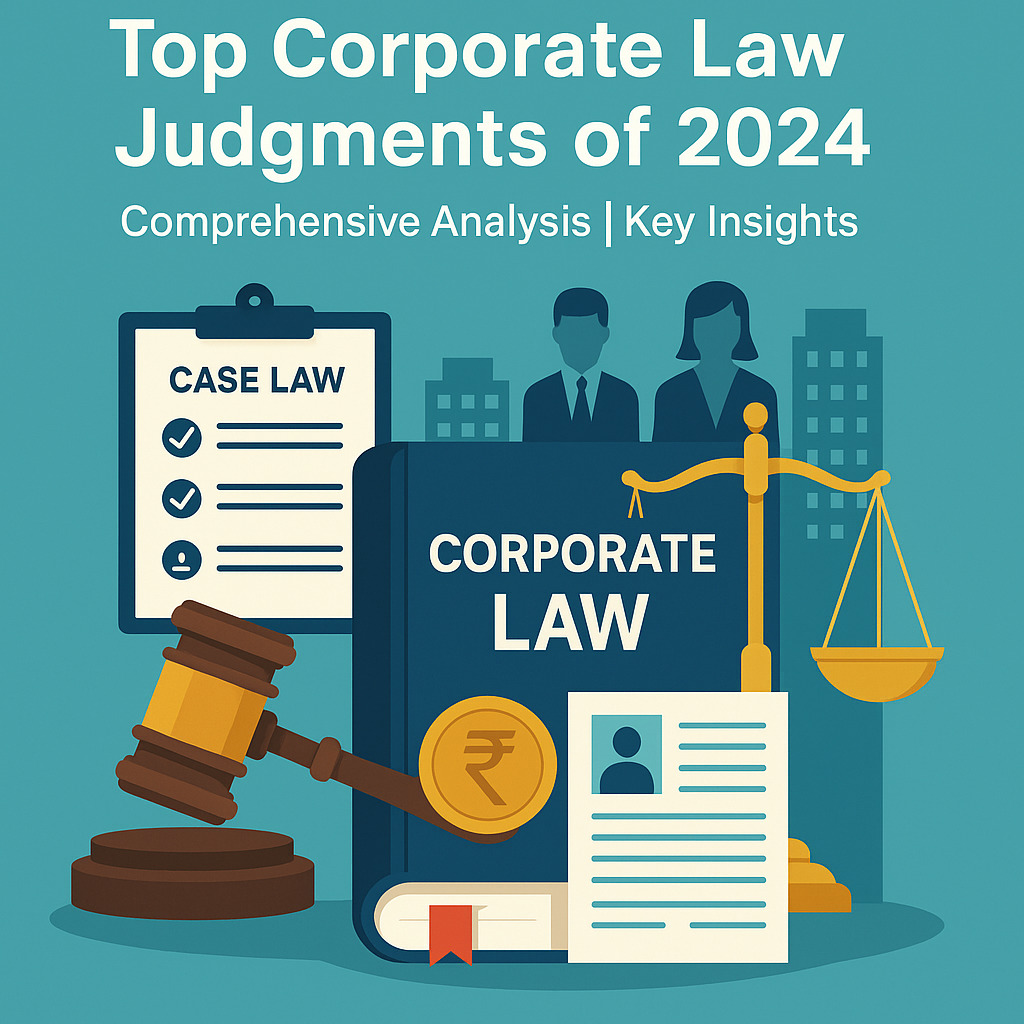View News
Top-Corporate-Law-Judgments-Key-Takeaways-and-Legal-Analysis

Top Corporate Law Judgments of 2024: Key Takeaways & Legal Analysis
Introduction
2024 has been a milestone year in the field of corporate law in India, with landmark rulings by the Supreme Court, High Courts, NCLT, and SAT clarifying ambiguities, establishing critical legal principles, and reshaping regulatory frameworks. From issues around promoter liability and preferential issue utilization, to interpretation of RPT thresholds and procedural defects in prosecutions — this year’s decisions offer valuable insights for legal practitioners, company secretaries, and corporate advisors alike.
Key Corporate Law Judgments of 2024: Detailed Case Summary
| S. No. | Case Title & Citation | Key Issue | Court / Tribunal | Legal Findings & Key Takeaways |
|---|---|---|---|---|
| 1 | Dr. Pradeep Mehta v. Union of India [2024] 165 taxmann.com 780 |
Whether SEBI/NSDL can freeze demat a/c of a person as a 'promoter' without active role or proper notice | Bombay High Court | Petitioner not shown to have active promoter role in recent filings Freezing demat account without show-cause violated natural justice No power under SEBI (LODR) or circulars to freeze accounts in other companies Power must trace back to SEBI Act, not subordinate legislation |
| 2 | Azim Premji Trust Services Pvt. Ltd. NCLT Bengaluru Bench |
Can a company limited by shares convert to a company limited by guarantee? | NCLT Bengaluru | No express bar in law despite lack of specific rules Permissible under Section 18 read with Section 230 Such conversion constitutes an “arrangement” under Sec. 2(21) |
| 3 | Philip India Ltd., In re [2024] 168 taxmann.com 141 |
Whether capital reduction is valid if objective is buyback of shares | NCLT Kolkata | Section 66(6) bars capital reduction for buyback Buyback must follow Sec. 68 procedure Reduction was incidental; actual purpose was buyback — hence disallowed |
| 4 | Asset Auto India (P.) Ltd. v. Union of India [2024] 167 taxmann.com 461 |
Whether Regional Director can reject amalgamation without Tribunal adjudication under Sec. 233 | Bombay High Court | Word “may” in Sec. 233(5) held to be mandatory RD must refer matter to Tribunal if public interest concerns exist RD’s outright rejection without adjudication was illegal |
| 5 | SEBI v. Alps Motor Finance Ltd. [2024] 159 taxmann.com 422 |
Whether shareholder ratification of misused preferential issue proceeds validates the deviation | Supreme Court | SEBI delayed SCN by 5+ years; SAT criticized the delay Shareholders ratified object change via special resolution SC upheld SAT’s ruling — no further penalty justified |
| 6 | State of Bihar v. Ziqitza Health Care Ltd. [2024] 161 taxmann.com 723 |
Are notes to accounts an integral part of the balance sheet? | Supreme Court | Explanatory notes are an integral part of financial statements Section 134(7) supports this view Technical evaluation must consider notes for accurate balance sheet reading |
| 7 | In the matter of Linde India Ltd. | How is 'materiality' determined for Related Party Transactions (RPTs) under Reg. 23 of SEBI LODR? | SEBI | RPT threshold = ?1000 Cr or 10% of consolidated turnover Cannot divide contracts to escape shareholder approval Literal interpretation must be followed to ensure compliance |
| 8 | Santosh Kumar Lahoti v. ROC, West Bengal [2024] 167 taxmann.com 361 |
Whether prosecution of CS alone, without arraigning company or directors, is valid under Sec. 448 | Calcutta High Court | Company & persons in control not named as parties CS acted in official capacity for company Prosecution without impleading principal parties is bad in law and abuse of process |
Conclusion
These decisions collectively reflect a maturing corporate legal framework in India — one that increasingly emphasizes procedural fairness, substantive statutory compliance, and principled interpretation of regulatory norms. Key takeaways from 2024 include:
-
Regulators like SEBI must respect procedural safeguards (natural justice, timelines, and show-cause processes).
-
Corporate actions like conversions, buybacks, and capital restructuring must strictly follow legal procedures — intent alone doesn’t suffice.
-
Shareholder rights and disclosures remain central to corporate governance, especially in RPTs and preferential issues.
-
The judiciary continues to check arbitrary executive actions and uphold due process.
As the business ecosystem evolves, staying updated with such judicial developments is critical for ensuring compliance, mitigating risk, and maintaining good governance practices.
"Unlock the Potential of Legal Expertise with LegalMantra.net - Your Trusted Legal Consultancy Partner”
Disclaimer: Every effort has been made to avoid errors or omissions in this material in spite of this, errors may creep in. Any mistake, error or discrepancy noted may be brought to our notice which shall be taken care of in the next edition In no event the author shall be liable for any direct indirect, special or incidental damage resulting from or arising out of or in connection with the use of this information Many sources have been considered including Newspapers, Journals, Bare Acts, Case Materials , Charted Secretary, Research Papers etc

